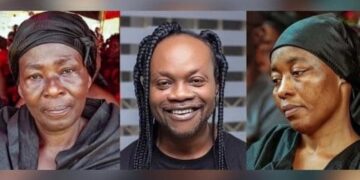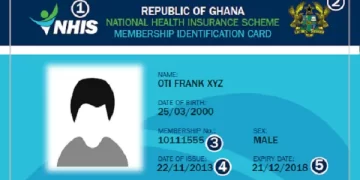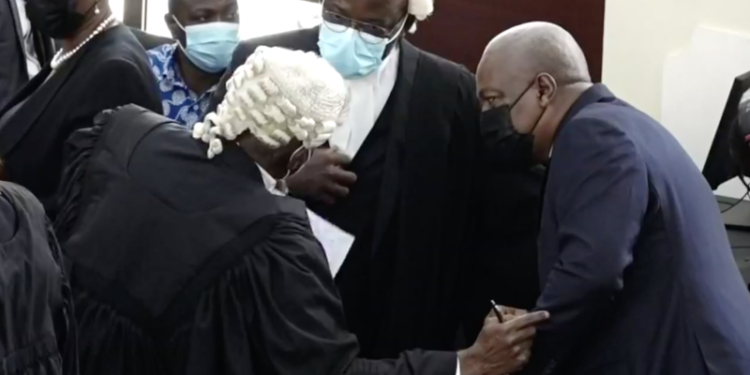The National Democratic Congress (NDC) flagbearer, John Dramani Mahama, had asked the Supreme Court to order a re-run of the 2020 elections.
According to the Supreme Court Justices, John Mahama was unable to persuade them to issue such an order.
The Supreme Court justices revealed this in their decision on John Mahama’s election petition case.
“The petitioner did not explain in any way how the errors [committed by the EC] influenced the declaration of the election,” Chief Justice Kwasi Anin-Yeboah said while reading the apex court’s decision.
As a result, there is no need for us to order a rerun [of the polls]. As a result, the appeal is dismissed.”
Background
John Mahama was contesting the poll results, claiming that none of the nine presidential candidates met the constitutional requirement of 50 percent plus one vote to be declared the winner.
Mr. Mahama requested five reliefs from the Supreme Court in his petition filed on December 30, 2020.
He requested the Supreme Court, among other items, to declare the EC’s announcement of President Nana Akufo-Addo as the election’s winner unconstitutional, null, and void.
Mr. Mahama’s points were focused on EC declaration errors as well as claims of vote padding.
He also requested that the Supreme Court direct the Electoral Commission (EC) to hold a new election between himself and President Akufo-Addo.
Johnson Asiedu Nketiah, Dr. Michael Kpessa-Whyte, and Rojo Mettle-Nunoo were the petitioner’s witnesses in court, and they were all cross-examined.
Counter arguments
The Electoral Commission and President Akufo-Addo, on the other hand, urged the supreme court to reject the petition.
They said the petition was incompetent, lacking in substance, and raising no legitimate cause of action.
Issues at stake
The court had to decide on the following issues: • If the petition discloses any fair cause of action.
• Whether or not, according to the information contained in the Electoral Commission’s declaration of President Akufo-Addo as president-elect, no candidate received more than 50% of the valid votes cast, as required by Article 63 (3) of the 1992 constitution.
• If the 2nd respondent still met the Article 63(3) of the 1992 constitution threshold by excluding or including the presidential election results from the Techiman South constituency.
• If the first respondent’s announcement of the results of the presidential election held on December 7, 2020 on December 9, 2020 was in violation of Article 63(3) of the 1992 constitution.
• If the petitioner’s allegations of vote padding and other errors influenced the outcome of the 2020 presidential election results.
Ruling
The Supreme Court ruled that the appellant failed to prove his case either through his petition or through his witnesses.
The accounts of Rojo Mettle-Nunoo and Dr. Michael Kpessa-Whyte were immaterial to the event, according to Chief Justice Anin-Yeboah, who read the decision, since the problem in dispute had nothing to do with how the results were collated at the Electoral Commission’s national collation centre, popularly known as the Strongroom.
Justice Anin-Yeboah said, “Their testimonies were unworthy in the settlement of the issues.”
Mr. Mettle-Nunoo and Dr. Kpessa-Whyte, he said, should be held responsible for leaving their posts while the results were being compiled.
Reasonable cause of action –According to Anin-Yeboah, the court was pleased after objectively reviewing the case so far that it discloses a cause of action and correctly invoked the court’s jurisdiction.
He clarified that the court does not need to consider the strength of the case when determining whether or not it has jurisdiction over the case. The fact that a party’s argument is poor is no reason to dismiss it.
Crossing 50%+1 votes threshold ruling: There is no question that the EC chairperson declared 13,434,74 valid votes cast instead of 13,121,111. Individual votes in the petition’s declaration on December 9 were calculated to be 13,121,111. (During PW1 Johnson Asiedu Nketiah’s cross-examination, this figure was admitted.) There is no question that the petitioner acknowledges that a total of 13,121,111 valid votes were cast. There is no legal reason for anybody to argue that the total valid votes should be 13,434,574.
The Supreme Court also claimed that holding on to the EC’s mistake against the commission was incorrect because the error was later corrected. Mahama’s legal team, according to Anin-Yeboah, was unable to produce any statute requiring the EC to consult stakeholders before making corrections.
Crossing 50%+1 vote threshold with or without Techiman South results ruling: With Techiman South included, the total number of valid votes would be 13,220,547. The computation will reveal that the second respondent received more than 50% plus one vote. Even if all 128,018 registered voters in Techiman South were attached to the petitioner, the second respondent will still reach the 50% mark (50.79 percent ).
The court stated that it was decided in court that President Nana Akufo-Addo had crossed the 50 percent +1 vote threshold even without the results from the Techiman South constituency prior to the presidential results being announced on December 9, 2020.
Declaration vs violation of Article 63 (3) of the 1992 Constitution: Judgement – The commissioner’s mistake would not render the declaration null and void. Accepting the petitioner’s case means that any errors made by the commission in a post will invalidate the statement’s validity, even if this is not the case. Article 63(3) of the 1992 Constitution was not violated by the Commission. The applicant was unable to demonstrate that none of the candidates received more than half of the total votes cast.
Whether alleged vote padding and errors affected the outcome of results: Conclusion – The accusations of vote padding are very serious to us. The petitioner has not proved this claim, as we have already said. Even if vote stuffing had happened, evidence shows that it would have been negligible in overturning the election result. The Petitioner did not provide any convincing evidence to support this argument. The pink sheets were supposed to be seen in court to justify the allegations. The allegations of incorrect vote aggregation were not proven. Even if the vote padding is approved, it will have no effect on Nana Akufo-votes. Addo’s
“We conclude this judgment by stressing that the petitioner failed to show how the alleged errors and unilateral corrections by the 1st respondent affected the validity of the declaration made by the 1st respondent’s Chairperson on December 9, 2020, as described in this judgment. The petitioner has failed to produce any evidence to refute the presumption established by the publication of CI 135… As a result, we see no need to order a rerun as requested by the petitioner. As a result, we reject the petition,” Mr. Anin-Yeboah said.
Read Also: Supreme Court will issue its decision on the Election Petition today
SOURCE: ATLFMNEWSONLINE



























